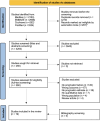Prognostic factors associated with failure of total elbow arthroplasty
- PMID: 38688503
- PMCID: PMC11060869
- DOI: 10.1302/2046-3758.135.BJR-2023-0281.R1
Prognostic factors associated with failure of total elbow arthroplasty
Abstract
Aims: The aims of this study were to identify and evaluate the current literature examining the prognostic factors which are associated with failure of total elbow arthroplasty (TEA).
Methods: Electronic literature searches were conducted using MEDLINE, Embase, PubMed, and Cochrane. All studies reporting prognostic estimates for factors associated with the revision of a primary TEA were included. The risk of bias was assessed using the Quality In Prognosis Studies (QUIPS) tool, and the quality of evidence was assessed using the modified Grading of Recommendations, Assessment, Development, and Evaluations (GRADE) framework. Due to low quality of the evidence and the heterogeneous nature of the studies, a narrative synthesis was used.
Results: A total of 19 studies met the inclusion criteria, investigating 28 possible prognostic factors. Most QUIPS domains (84%) were rated as moderate to high risk of bias. The quality of the evidence was low or very low for all prognostic factors. In low-quality evidence, prognostic factors with consistent associations with failure of TEA in more than one study were: the sequelae of trauma leading to TEA, either independently or combined with acute trauma, and male sex. Several other studies investigating sex reported no association. The evidence for other factors was of very low quality and mostly involved exploratory studies.
Conclusion: The current evidence investigating the prognostic factors associated with failure of TEA is of low or very low quality, and studies generally have a moderate to high risk of bias. Prognostic factors are subject to uncertainty, should be interpreted with caution, and are of little clinical value. Higher-quality evidence is required to determine robust prognostic factors for failure of TEA.
© 2024 Hamoodi et al.
Conflict of interest statement
Z. Hamoodi reports a grant for a joint research fellowship in which this study was undertaken, from the National Joint Registry and The Royal College of Surgeons of England, as well as a grant from the John Charnley Trust. Z. Hamoodi and J. C. Sergeant report that this study was supported by the Centre for Epidemiology Versus Arthritis (grant 21755). A. C. Watts has a consultancy agreement with Stryker Ltd, as well as grants or contracts from NIHR and TRB Chemedica, consulting fees from Medartis, and payment or honoraria for lectures, presentations, speakers bureaus, manuscript writing or educational events from Stryker and Arthrex, all of which are unrelated to this study. A. C. Watts is also Secretary Elect of the British Elbow and Shoulder Society, a board member of The Bone & Joint Journal, and editorial committee member of the National Joint Registry. The remaining authors have no conflict of interest.
Figures




References
Publication types
Grants and funding
LinkOut - more resources
Full Text Sources
Miscellaneous

